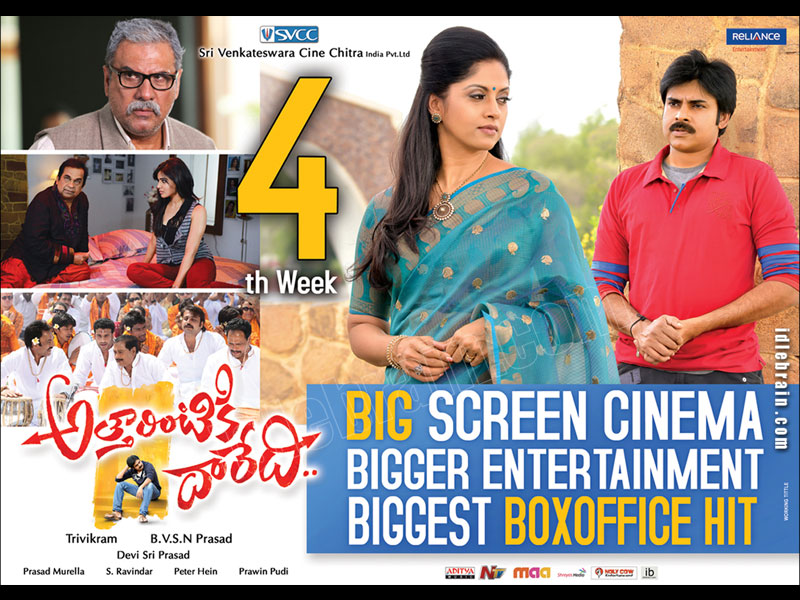I
remember a cinema-crazy friend remarking almost a decade back, that all Indian
movies can be reduced to a handful of basic storylines which when appropriately
tweaked at suitable positions yield a wide spectrum of diverse stories. Telugu
movies, since Gundamma Katha, have tinkered with the concept of protagonist(s)
entering a household (mostly antagonist’s) in disguise to bring about a change
in their hearts. In Hindi we have DDLJ in recent memory. It’s a time-tested
storyline, which if executed deftly, with judicious mix of déjà vu and novel
elements, has nearly always produced good results.
So
what freshness does Trivikram-Pawan Kalyan’s latest flick “Attarintiki Daredi”
bring to a much overused basic storyline? If its spectacular box-office
performance is any indication, the movie has indeed struck a chord with the
masses. Studying what makes a cinema click would bog down the best; any
industry-observer’s speculation is probably only as scientific as modern day
computer-empowered astrologer is.
‘Matala
Mantrikudu’ Trivikram Srinivas scores better over his director-self here. For a
change we witness Pawan Kalyan giving a controlled performance (if you excuse
some trademark Pawan eccentricism ) and his
confidence in director’s vision can be gauged by the fact that the film has a
non-fight climax – usually consider unsafe commercially for even normal actors,
leave alone one who’s earned the epithet ‘Powerstar’.
In the name of entertainment
Attarintiki
Daredi suffers not from inadequate commercial payoffs, the problem is more basic:
the tonal consistency of story itself. Entertainment (read comedy) has now
replaced ‘action’ as the safe bet, with a good dose of it usually ensuring
minimal returns. But entertainment should spring from the story itself and
should be consequence of story rather than filling the gaps in storyline.
Ace-director
Jandhyala’s movies for instance, revolved around the story during which course
comedy was also (or mostly) generated. Comedy, therefore, was a consequence and
byproduct of the story – although it filled too much of the palate. In the
present Sreenu Vyaita inspired comedy-genres however, the movie-stories are
designed so as to accommodate a standard set of fights, comedy sequences, and a
bakra role by Brahmanandam to give it a magical finishing touch.
 Entertainment
isn’t a dirty word – and we’re not asking for documentary type movies. All that
some movie-buffs ask for is to not sacrifice novelty at the altar of
entertainment and serve us trash. Paradoxically, its movies that strive to be
different that suffer from lack of clarity, the usual commercial masala movies
usually are pretty clear about their flow and direction.
Entertainment
isn’t a dirty word – and we’re not asking for documentary type movies. All that
some movie-buffs ask for is to not sacrifice novelty at the altar of
entertainment and serve us trash. Paradoxically, its movies that strive to be
different that suffer from lack of clarity, the usual commercial masala movies
usually are pretty clear about their flow and direction.
What
starts with a warm yearning of an aged father to see his long estranged
daughter, veers towards the irrelevant and the director struggles to fill in
the story with forced comedy sequences (which by themselves are efficient), but
which do not add to our story. This is easily excusable with any other director,
but Trivikram had shown immense promise in situating contextual comedy in
movies such as Nuvve Nuvve, Athadu, Nuvvu Naaku Nacchevu etc. It pains us that
while his pen continues to effortlessly entertain and move us; his directorial
vision appears to have turned myopic – thanks to commercial considerations.
Yet, it worked.
Nobody
knows for sure what works in cinema – the commercial elements forcefully
inserted (read fight sequences, comedy scenes etc.) are inspired from what’s
perceived to have worked for another movie. One cannot comment if the overall
storyline elevated the scene or the scene elevated the story. What works in one
sequence needn’t work for another.
To
be fair, Attarintiki Daredi is a reasonably well-made movie and while the
entertaining scenes engage us while watching, the emotional sequences remain
etched in our memory once we leave the hall. To its credit, the movie tries
hard to focus on the yearning of protagonist to get his atta back, and despite
diversions mostly succeeds in sticking to it.
Not
to say that Brahmanandam’s comedy was any less impactful. It worked wonders in
the cinema hall, only that the story gets least affected by its presence/
absence. Trivikram’s confidence, exemplified by a simple title that faithfully reflects
the storyline rather than something more powerful, is sadly missing in execution of the
movie itself.
You
sense director’s heart and mind in place towards the climax for he doesn’t
dilute it by bringing in fight sequences and confines his focus to emotions. One
line, mouthed by a comedian towards the climax, sums the mood of the movie: ‘ekkada neggalo kaadu, ekkada taggalo
telisinodu goppodu’. [ we could as well say - ekkada scene penchalo kaadu, ekkada tagginchalo telisinodu goppodu :-)]
Noble idea, good effort and better packaging....but still stops short of magical finish.
Comments
Post a Comment